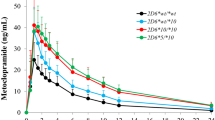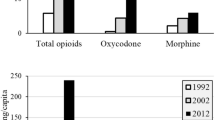Abstract
Objective
We investigated the effect of dosages of paroxetine and cytochrome P450 (CYP) 2D6 genotypes on the plasma concentration of paroxetine in Japanese patients being treated with paroxetine.
Methods
Blood samples were collected from 73 individuals after at least 2 weeks of the same daily dose of paroxetine. The plasma paroxetine concentration was measured using HPLC, and the CYP2D6 genotypes were identified by PCR. Genotype groups were compared by one-way analysis of variance at different paroxetine doses.
Results
The mean plasma paroxetine concentrations at daily doses of 10, 20, 30, and 40 ng/ml were 6.6±7.4, 34.9±26.8, 74.8±37.2, and 130.5±96.8 ng/ml, respectively, showing a disproportionate and nonlinear increase in plasma drug levels of paroxetine upon increasing doses. Plasma paroxetine concentrations in patients with CYP2D6*10 alleles were significantly higher than those without *10 allele at 10 mg/day (7.3±6.11 vs. 2.99±3.52 ng/ml), but there was no significant difference between *1/*1, *1/*10 and *10/*10 genotypes at the higher doses. Similarly, patients with CYP2D6*5 alleles showed higher plasma paroxetine concentrations than those without *5 allele, although differences in the plasma paroxetine concentration did not reach statistical significance level because of the small number of subjects with *5 alleles.
Conclusions
Our results indicate the possibility of saturation in paroxetine metabolism with an increase in paroxetine dose, and that CYP2D6*10 allele(s) have significant impact on plasma paroxetine concentration at low doses in Japanese population.


Similar content being viewed by others
Reference
Kaye CM, Haddock RE, Langley PF, Mellows G, Tasker TC, Zussman BD, Greb WH (1989) A review of the metabolism and pharmacokinetics of paroxetine in man. Acta Psychiatr Scand Suppl 350:60–75
Sindrup SH, Brosen K, Gram LF, Hallas J, Skjelbo E, Allen A, Allen GD, Cooper SM, Mellows G, Tasker TC et al (1992) The relationship between paroxetine and the sparteine oxidation polymorphism. Clin Pharmacol Ther 51:278–287
Bertilsson L, Dahl ML, Tybring G (1997) Pharmacogenetics of antidepressants: clinical aspects. Acta Psychiatr Scand Suppl 391:14–21
Bertilsson L, Dahl ML. 1996 Polymorphic drug oxidation. Relevance to the treatment of psychiatric disorders. CNS Drugs 5:200–223
Johansson I, Oscarson M, Yue QY, Bertilsson L, Sjoqvist F, Ingelman-Sundberg M (1994) Genetic analysis of the Chinese cytochrome P4502D locus: Characterization of variant CYP2D6 genes present in subjects with diminished capacity for debrisoquine hydroxylation. Mol Pharmacol 46:452–459
Someya T, Shimoda K, Suzuki Y, Sato S, Kawashima Y, Hirokane G, Morita S, Yokono A, Takahashi S (2003) The effect of CYP2D6 genotypes on the metabolism of haloperidol in a Japanese psychiatric population. Neuropsychopharmacology 28:1501–1505
Shimoda K, Someya T, Yokono A, Morita S, Hirokane G, Takahashi S, Okawa M (2002) Impact of CYP2C19 and CYP2D6 genotypes on metabolism of amitriptyline in Japanese psychiatric patients. J Clin Psychopharmacol 22:371–378
Yoon YR, Cha IJ, Shon JH, Kim KA, Cha YN, Jang IJ, Park CW, Shin SG, Flockhart DA, Shin JG (2000) Relationship of paroxetine disposition to metoprolol metabolic ratio and CYP2D6*10 genotype of Korean subjects. Clin Pharmacol Ther 67:567–576
Sindrup SH, Brosen K, Gram LF (1992) Pharmacokinetics of the selective serotonin reuptake inhibitor paroxetine: nonlinearity and relation to the sparteine oxidation polymorphism. Clin Pharmacol Ther 51:288–295
Kronbach T, Mathys D, Umeno M, Gonzalez FJ, Meyer (1989) Oxidation of midazolam and triazolam by human liver cytchrome P4503A4. Mol Pharmacol 36:89–96
von Moltke LL, Greenblatt DJ, Cotreau-Bibbo MM, Harmatz JS, Shader RI (1994) Inhibitors of alprazolam metabolism in vivo: effect of serotonin-reuptake inhibitor antidepressants, ketoconazole and quinidine. Br J Clin Pharmacol 38:23–31
Hikida K, Inoue Y, Nouchiand E, Ohkura Y (1990) Determination of Etizolam in human Serum or Plasma Using Automated Cloumn-Switchig High-Performance Liquid Chromatography. Jpn J Clin Chem 19:354–359
Steen VM, Andreassen OA, Daly AK, Tefre T, Borresen AL, Idle JR, Gulbrandsen AK (1995) Detection of the poor metabolizer-associated CYP2D6 (D) gene deletion allele by long-PCR technology. Pharmacogenetics 5:215–223
Heim M, Meyer UA (1990) Genotyping of poor metabolizers of debrisoquine by allele-specific PCR amplification. Lancet 336 529–532
Johansson I, Lundqvist E, Bertilsson L, Dahl ML, Sjoqvist F, Ingelman-Sundberg M (1993) Inherited amplification of an active gene in the cytochrome P450 CYP2D locus as a cause of ultrarapid metabolism of debrisoquine. Proc Natl Acad Sci USA 90:11825–11829
Dahl ML, Johansson I, Bertilsson L, Ingelman-Sundberg M, Sjoqvist F (1995) Ultrarapid hydroxylation of debrisoquine in a Swedish population, Analysis of the molecular genetic basis. J Pharmacol Exp Ther 274:516–520
Tateishi T, Chida M, Ariyoshi N, Mizorogi Y, Kamataki T, Kobayashi S (1999) Analysis of the CYP2D6 gene in relation to dextromethorphan O-demethylation capacity in a Japanese population. Clin Pharmacol Ther 65:570–575
Preskorn S (1994) Targeted pharmacotherapy in depression management: comparative pharmacokinetics of fluoxetine, paroxetine and sertraline. Int Clin Psychopharmacol Suppl 3:13–19
Suzuki A, Otani K, Mihara K, Yasui N, Kondo T, Tokinaga N, Furukori H, Kaneko S, Inoue Y, Hayashi K (1998) Effects of various factors including the CYP2D6 genotype and coadministration of flunitrazepam on the steady-state plasma concentrations of bromperidol and its reduced metabolite. Psychopharmacology (Berl) 135:333–337
Roh HK, Chung JY, Oh DY, Park CS, Svensson JO, Dahl ML, Bertilsson L (2001) Plasma concentrations of haloperidol are related to CYP2D6 genotype at low, but not high doses of haloperidol in Korean schizophrenic patients. Br J Clin Pharmacol 52:265–271
Acknowledgements
This research was supported by the Grant in Aid for Scientific Research (KAKENHI) from the Japan Society for the Promotion of Research (#13670991, #13671000, and #15591214).
Author information
Authors and Affiliations
Corresponding author
Rights and permissions
About this article
Cite this article
Sawamura, K., Suzuki, Y. & Someya, T. Effects of dosage and CYP2D6-mutated allele on plasma concentration of paroxetine. Eur J Clin Pharmacol 60, 553–557 (2004). https://doi.org/10.1007/s00228-004-0792-6
Published:
Issue Date:
DOI: https://doi.org/10.1007/s00228-004-0792-6




